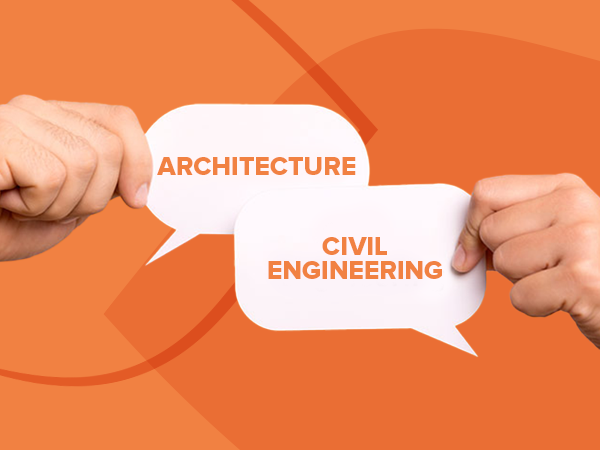Architecture vs Civil Engineering – Which One is a Better Career Option?
Architecture vs Civil Engineering

Architecture vs Civil: Leaning Tower of Pisa, The Golden gate Bridge, Taj Mahal and many other marvels – do such structures, their designing and complexity fascinate you? Then I think you can make your career in field that involves designing and building infrastructure.
For someone passionate about building and designing structures, civil engineering and architecture degrees both are perfect for you. Architecture and Civil Engineering both fields deal with the construction of different buildings, roads, bridges, dams, and more.
However, did you ever think about the difference between an architect and a civil engineer? Architecture and civil engineering are interrelated to each other, and yet they are two separate disciplines. For those curious about making a career in one of them and understanding what is the difference between civil engineering and architecture, read below.
The Difference Between Architect and Civil Engineer
An architect is responsible for designing and planning buildings like sports arenas, houses, office structures, museums, factories, skyscrapers and many more. On the other hand, civil engineer responsibilities are way broader than an architect. A civil engineer deals with the planning and construction of roads, dams, bridges, tunnels and other infrastructures.
Generally, an architect spends most of the time working in an office and is involved in the pre-construction phases such as designing and planning. A civil engineer is involved in designing, planning and overseeing the construction process. Architects do not supervise the construction process like a civil engineer does. Civil engineers spend half of their time in the office and half on the construction sites.
Now that you know the difference between an architect and a civil engineer – let us move forward to their roles and responsibilities.
Architecture vs Civil Engineering: Roles and Responsibilities
Civil engineers and architects do team on some projects. They both go to construction sites to make sure the work is done correctly and on time. Civil engineers and architects need to estimate costs and design plans based on projected budgets. While civil engineers decide on the materials to be used to assure a safe structure, architects emphasize more on the project’s design.
Responsibilities of an Architect:
- Work on projects that can be a small room, office or an entire building.
- Use computer software such as CADD for creating scaled drawings and presenting the plan to workers.
- Ensuring higher creativity and vision in projects to make them look appealing to the clients.
- Handling multiple projects so need to be organized to keep an eye on every aspect of architectural development.
- Need to evaluate time and budget, manage structure specifications, design drawings and plan and set up contracts. With greater work experience as an architect, you can work in higher job roles like an architectural manager.
Responsibilities of a Civil Engineer:
- Supervise and devise roadways, bridges, water systems, facilities, and dams, among other structures.
- Work in the office to devise and plan projects and also visit the construction site to oversee the work.
- Deal with complex designs and find solutions that may come along with the progress in the project. Civil engineers having good problem-solving and math skills have the upper hand working with complex designs.
- Need to test building materials, conduct survey operations and use design programs.
- Obey ordinances, assess potential project risks and oversee the infrastructure maintenance.
Architecture vs Civil Engineering – Degree Courses
For becoming an architect, you can study Bachelor of Architecture (B.Arch.) at the undergraduate level. The duration of the B.Arch. degree course is 5-years, and the course primarily focuses on educating students about artistic and aesthetical aspects of a building. You can start with a job or study further in the field.
For becoming a civil engineer, you can study Bachelor in Civil Engineering, a four-year course at the undergraduate level. Studying Diploma in Civil Engineering is also a good option. Such diploma courses are shorter in duration than degree courses. Civil engineering is primarily focused on the mathematical and scientific aspects of a building. You can start with a job or study master in civil engineering or any other relevant area.
No matter, which course you choose between B.Arch. and Bachelor in Civil Engineering, ensure you study at a college like Marwadi University. With advanced education & research facilities, PhD faculties, NAAC A+ certification, high-tech labs & libraries, industry mentorship and more at Marwadi University, your future is more promising!
Architecture vs Civil Engineering – Specializations
Whether you choose architecture or civil engineering, there are a lot of specializations available to you.
Some architecture specializations you can explore are:
- Urban Planning/Design
- Landscape Architecture
- Sustainable Architecture
- Industrial Architecture
- Interior Architecture
Some civil engineering specializations you can explore are:
- Transportation Engineering
- Geotechnical Engineering
- Water Resources Engineering
- Structural Engineering
- Environmental Engineering
Architecture vs Civil Engineering – Eligibility Criteria
- Because both fields are closely related, the eligibility criteria for both are more or less the same.
- Although some colleges may ask you to appear for the entrance examination to secure admission, it may vary depending on the programme you choose.
- To study a bachelor course, you must have cleared 10+2 classes in the science field. You have to clear entrance exams like JEE, AIEEE or other college-based exams for securing admission.
- For getting a master’s degree, you will have to complete a bachelor’s degree in the same or relevant field.
- Some colleges may ask for LOR or SOP.
- Many universities provide admission on a merit basis too.
Architecture vs Civil Engineering – Skills You Must Have
Here are some crucial skills you need to acquire to work as an architect or a civil engineer.
- Good design ability for the project planning, and you will use both hand-written and computer design skills to design attractive and practical buildings.
- You will need good oral and written communication skills to deal with clients, suppliers and supervise the people working at the construction site.
- Creative thinking will help you design unique and practical solutions at the time of unforeseen circumstances like natural calamities, changing regulations and so on.
- Computer literacy to use Computer-Aided Design (CAD) and Building Information Modelling (BIM) software.
- Technical expertise to get involved in the construction process and manage the project till its completion. This skill is most relevant to civil engineers.
- You have to be well-learned in advanced mathematics for demonstrating dimensions, materials, potential risks, stress factors, and so on.
Architecture vs Civil Engineering – Job Roles
You can take up almost any job opportunity in the construction sector after completing your bachelors in architecture or civil engineering. However, for securing a higher position, you need to have a Master’s degree. Check below some job roles you can look forward to:
Architecture jobs:
- Landscape Architect
- Urban Planner
- Interior Designer
- Design Architect
- Architect
Civil Engineering jobs:
- Structural Engineer
- Geotechnical Engineer
- Environmental Engineer
- Marine Engineer
- Civil Engineer
Architecture vs Civil Engineering – Which One is Better?
Both architecture and civil engineering assists you build a rewarding career as they are promising degrees, having their own significant benefits. Both degrees are similar in terms of salary and prestige.
Civil engineers work with the structural planning and implementation of the architect’s creativity and design, whereas architects deal with the design and aesthetic components.
So, when it comes to deciding between civil engineering and architecture, it all comes down to your interest and passion for the subject. Choose wisely, considering that you will spend your entire career working in it!!



